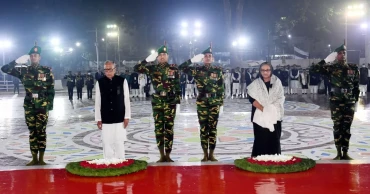Language Movement
‘Language Movement like a lighthouse for the nation’: Bangladesh Embassy in Washington observes Feb 21
The Bangladesh Embassy in Washington DC observed “Mohan Shaheed Dibosh” and the International Mother Language Day on Tuesday by paying tributes to the martyrs of the 1952 Language Movement.
The Embassy arranged an elaborate program to commemorate the supreme sacrifice of the language heroes who laid down their lives to establish Bangla as the state language.
The day-long program started with placing of a floral wreath at the altar of the Shaheed Minar by the Bangladesh Ambassador on the embassy premises at one-minute past zero hour.
The immortal song composed on ‘Amar Ekushey’ — " Amar Bhaiyer Rakte Rangano Ekushey February, Ami Ki Bhulite Pari” — was played at that time. Embassy officers and employees and members of their families were also present on the occasion.
Also read: Sri Lanka marks International Mother Language Day
In the morning, the Ambassador hoisted the national flag at half-mast in front of the Chancery in the presence of the Embassy officials and employees. A ‘Probhat Pheri’ was arranged to commemorate the day.
A floral wreath was also placed at the bust of Bangabandhu Sheikh Mujibur Rahman at the Bangabandhu Corner of the Embassy to pay deep respect to the Father of the Nation.
3 years ago
'Sheikh Mujib one of the key figures behind Language Movement'
Bangabandhu Sheikh Mujibur Rahman was one of the key figures behind organizing the Language Movement, for which he had to languish in jail, Prime Minister’s ICT Adviser Sajeeb Wazed Joy wrote.
Along with a tribute video, on the occasion of International Mother Language Day, posted on his verified Facebook profile yesterday, Sajeeb Wazed wrote: “On November 17, 1999, February 21 was proclaimed as the International Mother Language Day with 188 countries approving of the bill placed at an UNESCO assembly in Paris.
“On impact, the world has been observing the International Mother Language Day since February 21, 2000.”
“The history of Language Movement is traced back to the birth of Pakistan as a state,” he wrote.
“Since the partition, the Pakistani rulers had employed a spectrum of measures to annihilate Bengali culture, art, and literature. That cycle of injustice heavily moved then young leader Sheikh Mujibur Rahman, who later would turn into the Father of the Nation. He was one of the key figures behind organizing the Language Movement for which he had to languish in jail.
“Upholding the glory of Bangla language was the mission he undertook himself around and finally led the nation to earn its freedom.
That movement paved the path for our freedom and liberation. Following in his footsteps, his daughter Sheikh Hasina’s efforts earned our language another crown. Today February 21 is a cherished day across the entire planet,” Sajeeb Wazed wrote.
Read more: President, PM lead nation in paying tribute to Language Movement heroes
3 years ago
President, PM lead nation in paying tribute to Language Movement heroes
President Abdul Hamid and Prime Minister Sheikh Hasina tonight paid rich tributes to the martyrs of the historic Language Movement by placing wreaths at the Central Shaheed Minar marking ‘Amar Ekushey’ -- the International Mother Language Day and Shaheed Dibosh.
They placed floral wreaths at the Central Shahid Minar here at one minute past midnight.
Prime Minister Sheikh Hasina arrived at the Shaheed Minar seven minutes before the clock struck 12. On her arrival, she was received by Dhaka University Vice-chancellor Prof Dr Md Akhtaruzzaman.
Later, the Prime Minister and the VC received the President when he arrived four minutes before the zero hour.
President Abdul Hamid and Prime Minister Sheikh Hasina proceeded to the altar of the Central Shaheed Minar together as the immortal song on Amar Ekushey—'Amar Bhaiyer Rakte Rangano Ekushey February’-- was playing.
3 years ago
Tracing the Roots of Ekushey Boi Mela
The Bangla language has always been at the forefront of our national identity. Amar Ekushey Boi Mela (Book Fair) is a significant part of Bangladesh’s history, culture and literature. Every year, the book fair is held in the month of February. It is the biggest book fair in the country where publishers display and sell printed books under diverse categories. This fair offers great opportunities for the readers to meet their favourite writers, poets, novelists, and publishers face-to-face. Besides serving as a platform to encourage readers to read and buy books, the Boi Mela also works as a monthlong cultural hub – showcasing the diversity of Bangladesh. Let’s look into the history of the Amar Ekushey Boi Mela.
CHITTARANJAN SAHA: STARTING BOI MELA FROM A MAT AT BANGLA ACADEMY PREMISES
Chittaranjan Saha was born in the Noakhali district in 1927. His publishing house Punthighar Prokashoni, located at Banglabazar in Dhaka, was burnt down in 1971. Chittaranjan Saha left Dhaka after March 26. He took shelter in Agartala and then moved to Calcutta (Kolkata) during the Liberation War.
During the Liberation War, many prominent writers, artists, and journalists from Bangladesh had to stay in Calcutta as refugees. During that period, Chittaranjan arranged a meeting with some of the most prominent litterateurs residing in Calcutta. They decided to write and publish about the injustice and war in Bangladesh (then East Pakistan). Thus, Muktodhara was born.
In February, 1972, Chittaranjan Saha laid a mat under the tree in front of the Bangla Academy building and put on display about 32 (33 according to some sources) books as a homage to the Language Movement martyrs of 1952.
Though Chittaranjan Saha initiated the Boi Mela from a humble beginning, according to some sources, he was not the first person who started selling books at Bangla Academy premises in February. Ruhul Amin Nizami of Standard Publishers started displaying Russian books. Those books were very popular at that time for their rich content and affordable prices.
Read More: Ekushey Book Fair to span entire February again after two years
HISTORY BEHIND THE FIRST BOOK FAIR IN BANGLADESH
Though Chittaranjan Saha is recognised as the initiator of Ekushey Boi Mela, the root of the book fair goes deeper.
The first book fair in then East Pakistan was held in 1965. The initiative was taken by Sardar Jainuddin, who was born in 1918 in Pabna.
In 1965, he started displaying some children’s books on the ground floor of the Dhaka University Library. At that time, he was working on a project for UNESCO regarding children’s books.
In 1970, Jainuddin organised a book fair in Narayanganj in association with Narayanganj Club.
As UNESCO declared 1972 the ‘International Book Year’, in December, Jainuddin took initiative to arrange a book fair inside Bangla Academy. Since then, Bangla Academy got directly involved with book fair events.
Read More: Bangabandhu Memorial Museum: Witness to History and Tragedy
THE JOURNEY OF EKUSHEY BOI MELA
Chittaranjan Saha continued putting books on display and selling them at the Bangla Academy premises for a few more years. In 1976, getting inspired by this idea of selling books, other publishers came together and joined in. Bangla Academy merged with this initiative in 1978.
Ashraf Siddiqui was the director general of Bangla Academy at that time, and he had an active role in the association of academy with the book fair. Bangla Academy’s association took Boi Mela to another level.
In 1979, a book fair was held at the courtyard of Bangla Academy with the collaboration of ‘Bangladesh Pustok Bikreta O Prokashok Samity’ (founded by Chittaranjan Saha) and the Bangla Academy authority.
Read More: Top Sculptures in Dhaka City
3 years ago
International School Dhaka pays tributes to Language Movement martyrs
International School Dhaka (ISD) has recently arranged separate assemblies for primary and secondary schools to observe International Mother Language Day 2022.
Students from playgroup to Grade 12, their parents, and school staff attended the event online.
Read: Discussion on International Mother Language Day held at Russian House
There were performances by enthusiastic students on this occasion, including an instrumental entry in piano playing “Amar Bhai Er Rokte Rangano”.
The assembly came to an end with the concluding speech by Thomas Van der Wielen, the director of ISD)l.
ISD is a community of 32 different nationalities, and throughout these assemblies, they have celebrated language diversity in their community.
4 years ago
Bangladesh emerged from language movement- Qazi Kholiquzzaman
Eminent economist, chairman of Palli Karma-Sahayak Foundation (PKSF) Dr. Qazi Kholiquzzaman Ahmad emphasized speaking Bengali correctly as the language has a long history and heritage.
He called for preserving the elements of heritage at local and regional level for the future generation.
The Bengali language should be practiced all the year, not in a specific month of the year as it is a constitutional right of the people, Kholiquzzaman said.
READ: Sajeeb Wazed highlights Bangabandhu's heroic role in language movement
He came up with remarks while addressing as the chief guest at a webinar titled ‘70 Years of Language Movement & International mother language day-2022’ organized by Dhaka School of Economics on Monday.
He discussed the significance of the language movement in 1952 to the emergence of Bangladesh in 1971.
He argued for the use of Bengali language in judicial proceedings and medical sector of the country and international negotiation.
The seminar was presided over by Entrepreneurial expert and Macroeconomic specialist Professor Dr.Muhammad Mahboob Ali.
He praised the role of the father of the nation Bangabandhu in the language movement and creation of Bangladesh.
Among others assistant professors of Dhaka School of Economics Rehana Parvin,Sara Tasneem, Afia Akter and Mohammad Aman Ullah Aman, spoke at the webinar.
4 years ago
Grateful nation remembers language martrys amid pledge to fulfill their dreams
The nation on Monday paid homage to the martyrs of the 1952 Language Movement, marking 'Amar Ekushey' and International Mother Language Day.
The great Language Movement, a significant event in the nation’s history, was aimed at establishing the right of the mother tongue as well as protecting self-entity, and culture and heritage.
President Abdul Hamid and Prime Minister Sheikh Hasina paid tribute to the martyrs of the Language Movement at the start of day.
On behalf of the president, his Military Secretary Major General SM Salahuddin Islam placed a wreath at the Central Shaheed Minar at one minute past midnight.
On behalf of the prime minister, her Military Secretary Major General Naquib Ahmed Chowdhury placed a wreath at the Central Shahid Minar in Dhaka at one minute past midnight.
President Abdul Hamid and Prime Minister Sheikh Hasina paid rich tribute to the language heroes.
Sheikh Hasina also released a special commemorative postage stamp, an opening day cover and a data card marking 70 years of Amar Ekushey and Golden Jubilee of observing Amar Ekushey in the independent Bangladesh.
Read:Bangladesh Mission in New Delhi pays homage to language martyrs
4 years ago
Street drama 'Rokte Lekha Bangla Bhasha' performed in city
A street drama 'Rokte lekha Bangla Bhasha’ written in the context of Language Movement in 1952 was performed in the city on Monday in remembrance of the language martyrs.
On the occasion of Martyrs' Day and International Mother Language Day, Open Dialogue Bangladesh (OPD) hosted the street drama in front of Jatiya Press Club.
In backdrop of Pakistan's conspiracy against the Bangla language and Bengali culture and the persecution of Bengalis by Pakistani forces since the partition in 1947 were highlighted in the drama 'Rokte Lekha Bangla Bhasha’.
Read:Bangladesh Mission in New Delhi pays homage to language martyrs
The drama was directed by Samad Bhuiyan and presented by his team.
Artists Umme Salam Shimu, Vashkar Roy, Naima Akhter, Steve Aaron Barai, Smriti Akhter, Tahfimul Islam Apu, Fatema Akhter Trisha, Sajjad Masood Soumya, Sabrina Islam, Ariful Islam, Abdur Rahman Rakib and Samad Bhuiyan performed in the play.
The artists presented national and patriotic songs before the 30-minute street drama.
4 years ago
Pak conspiracy against Bangla language, culture still on: Speakers
Speakers at a discussion on Monday said Pakistan’s conspiracy against Bangla language and Bengali culture has not stopped yet which was started immediately after the partition in 1947.
The discussants said people responded to the conspiracy by defeating Pakistanis in the Language Movement and the War of Liberation but the conspiracy of Pakistan and its followers continues.
The discussion titled ‘Twenty-one to seventy-one: the Golden Jubilee of Independence and the Mujib Year’ was organised marking the Martyrs' Day and International Mother Language Day at Jatiya Press Club.
Read: Street drama 'Rokte Lekha Bangla Bhasha' performed in city
Voluntary organization Media Forum for Human Rights and Environmental Development (MHED) organized the discussion.
President of Bangladesh Federal Union of Journalists (BFUJ) Omar Farooq was the chief discussant.
President of Dhaka Union of Journalists Quddus Afrad and President of Bangladesh-India Sampriti Parishad Freedom Fighter Professor Fazle Ali spoke as special guests with MHED's Advisor and President of Indian Media Correspondents Association, Bangladesh (IMCAB) Basudeb Dhar in the chair.
Besides, NAP Secretary General Golam Mostafa Bhuiyan, General Secretary of Indian Media Correspondents Association, Bangladesh (IMCAB) Masum Billah, Treasurer Aminul Haque Bhuiyan, Executive Director of MHED Rafiqul Islam Sabuj were present.
Read:Ekushey observed in Canberra with participation of Bangladesh community, foreigners
The speakers said Pakistanis were trying to impose Urdu language in 1952 by saying that Urdu was the language of Muslims and Islam.
But this is not true, even Urdu is not the provincial language in any province of Pakistan, they said.
The speakers said Pakistanis determined the character of a language from their communal consciousness and thinking.
4 years ago
AL destroyed Language Movement spirit: BNP
BNP on Monday accused the current Awami League government of destroying the spirit of the Language Movement by imposing a “fascist” rule on the country’s people.
“This is our bad luck now there’s a government in power which has distorted the spirit of Amar Ekushey. It has snatched the right to vote and freedom of speech,” said BNP secretary general Mirza Fakhrul Islam Alamgir.
Talking to reporters after paying homage to language martyrs by placing wreaths at the altar of Central Shaheed Minar, he also said the current government is crippling the country’s economy.
Read:Get ready, hit the streets: Fakhrul asks BNP followers
“A horrible fascism is going on in the country…we’ll create a mass uprising here with the spirit of Language Movement to remove it and free our leader Begum Khaleda Zia. Through it, we’ll truly implement the spirit of Ekushey,” the BNP leader said.
He said many people, including Salam, Barkat, Rafiq, Jabbar, sacrificed their lives on the streets on 21st February in 1952 to establish Bangla as the state language. “As a result, the then Pakistani ruler was forced to recognise Bengali as the state language.”
The BNP leader said the main spirit of the Language Movement was to liberate the country for establishing a democratic and free society having the freedom of expression, freedom of the press, and every right of people.
“We waged the Liberation War with that spirit. But the current regime has destroyed that spirit and dashed all the hopes and aspirations of people,” he bemoaned.
Fakhrul said the government has continued its repressive acts by implicating their top leaders and lakhs of leaders and activists in false cases. “We must get rid of it.”
Earlier in the day, leaders and activists of the party gathered in front of Balaka Cinema Hall at Nilkhet at 6 am wearing black badges. Later, they first offered fateha at the graves of Language Movement martyrs at Azimpur Graveyard and then went to the Central Shaheed Minar to pay tributes to the martyrs.
Read: ‘Ruling party syndicate’ behind price hike: BNP
On Sunday, the party arranged a discussion at the Institution of Engineers, Bangladesh, marking the Shaheed Day and International Mother Language Day.
BNP also kept their party and national flags at half-mast and hoisted black flags at its Nayapaltan central office at 6 am in observance of the day.
Besides, BNP’s different units across the country are also observing the day with due respect amid various programmes.
Ekushey February is observed simultaneously as Shaheed Dibas and International Mother Language Day in recognition of the Bengali nation’s supreme sacrifice to the cause of their mother tongue. In 1999, UNESCO declared the 21st of February as the International Mother Language Day.
4 years ago





.jpg)



.jpg)



